Sports
Society
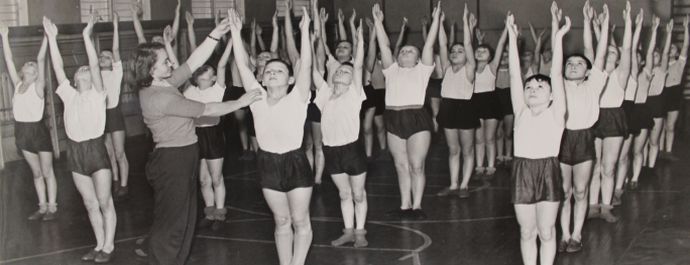
In the Communist bloc, sports were part of the system of controlling themasses. The importance given to gymnastics – a demanding sport thatrequires endless repetition of the same movements and total submission ofthe body – was perfectly adapted to what Communist regimes required fromtheir citizens. In the 1980s, massive sports events were still beingorganized in the USSR and Czechoslovakia in praise of the physicalqualities of “Eastern man and woman.” While sports policies were not unique to totalitarian regimes, a communistathlete’s victory was nevertheless seen as a victory for the entiresystem – the victory of an ideology even more than of a nation. For thisreason, sport was used as a tool of propaganda on a very large scale inthe Communist bloc. During the early 20th century, the USSR refused to participate ininternational competitions, judging them to be too closely modeled onCapitalist competitiveness and too unlike its own principles ofinternationalism. Nevertheless, the second half of the 20th centurywitnessed the Communist countries use of athletic victories as a factor ofpower during the Cold War. An entire system of mass detection,quasi-military training, and sometimes even organized doping systems as inEast Germany, led the USSR and its satellites to reap a huge harvest oftitles and medals, particularly at the Olympic Games. Veritable nationalheroes, the most successful athletes acquired access to the privileges ofthe nomenclature. This led to athletic competition becoming highly politicized events.East-West rivalry was patent at the ice-hockey finales between theAmericans and the Soviets, as well as between East German and West Germancyclists and during the boycotts of both the Moscow Olympics in 1980 andthe Los Angeles Games in 1984. Sporting events also mirrored tensionswithin the Communist bloc, particularly when Romanian, Czechoslovakian orPolish athletes contested the supremacy of their Soviet counterparts.
Archive
Opening ceremony of the Moscow Olympics
On July 19 1980, Leonid Brezhnev, Head of the USSR, presided over the opening ceremony of the XXII Olympic Games during a tense international climate.
country: Soviet Union / year:
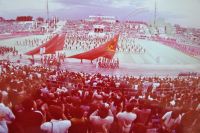
On July 19 1980, Leonid Brezhnev, Head of the USSR, presided over the opening ceremony of the XXII Olympic Games during a tense international climate. Only 80 countries participated in that year’s edition, the lowest number in 34 years; the other countries responded favourably to the United States’ and President Carter’s call for a boycott after Soviet troops invaded Afghanistan in 1979. Thirteen nations, including France, chose to participate under the banner of the Olympic flag. This picture of the opening ceremony shows how similar early-1980s Soviet parade aesthetic still were to early 20th-century ones.
Poster denouncing doping practices
"Sport makes you healthy. ONLY LIKE THIS!"
country: Soviet Union / year:
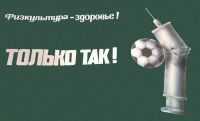
"Sport makes you healthy. ONLY LIKE THIS!" Doping in sport was not the privilege of Eastern Bloc countries in the 20th century. However, it was part of athletics policies organized in the USSR and its satellites in the 1950s, particularly through the use of anabolic steroids. Both the Soviet ice-hockey team and its track-and-field athletes raised suspicion. Taking it further than any other country, East Germany organized a complete, large-scale, scientific and political doping system of its athletes (swimmers, cyclists, track and field and more) in order to demonstrate its supremacy over its Western rival, at a time when West Germany was exerting powerful appeal on East Germans. This poster portrays both the political “transparency” sought by perestroika and the usual propaganda on that topic.
Polish pole-vaulter Władysław Kozakiewicz, wins a gold medal at theMoscow Games of 1980 and gives the Muscovite public the finger.
In 1980, Polish pole-vaulter Władysław Kozakiewicz was at the height of his athletic career.
country: Soviet Union / year:
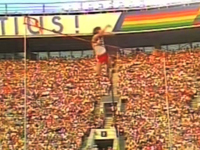
In 1980, Polish pole-vaulter Władysław Kozakiewicz was at the height of his athletic career. Holder of the world record, he was favored to win at the Moscow Olympics, and did so easily, despite the public’s noisy hostility in support of his Soviet rival. His daring to give them the finger at the moment of his victory struck a real chord, because it preceded by only a few days the worker’s strikes in Poland and the creation of the Solidarnosc trade union, which would soon express its own hostility to the Communist regime. In 1984, Władysław Kozakiewicz fled political troubles in Poland and moved to Western Germany, where he pursued his sporting career.
The Hungarian Olympic committee discusses the boycott of the Los Angeles Olympics of 1984.
Hungary, a “satellite” country, which would later boycott the Los Angeles Games of 1984, had always been a very active participant in the summer Olympics
country: Soviet Union / year:
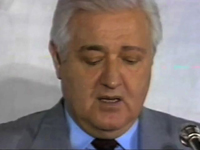
Hungary, a “satellite” country had always been a very active participant in the summer Olympics, particularly in fencing, for which it had won many titles. It remained loyal to the Soviet big brother by participating in the Moscow Games of 1980, despite the West’s boycott in protest over the invasion of Afghanistan, and by boycotting the Los Angeles Games of 1984.
The Spartakiads
Moscow originally created the “Spartakiads,” in 1928, to rival the Olympics.
country: Czechoslovakia / year:
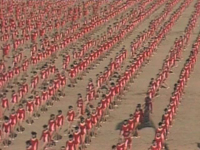
Moscow originally created the “Spartakiads,” in 1928, to rival the Olympics. The “International Spartakiads” ceased after 1952, but the name continued to be used for gymnastic competitions held every five years, particularly the ones at the Strahov Stadium in Prague, Czechoslovakia, as this document illustrates. A mix of inter-generational collective gymnastics and parading before officials, they remind us that Communist parties thought of these athletic events and marches as symbols of citizens’ support for the regime and its ideology.
The Czechoslovakian team’s victory during the hockey World Cup final
Ice-hockey events were regular occasions for rivalry between East and West, because the United States, Canada, the USSR and Czechoslovakia dominated the sport throughout the Cold War.
country: Czechoslovakia / year:
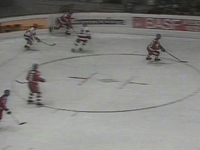
Ice-hockey events were regular occasions for rivalry between East and West, because the United States, Canada, the USSR and Czechoslovakia dominated the sport throughout the Cold War. Sweden often played the role of referee. Between 1963 and 1989, the USSR and Czechoslovakia won 23 out of 24 World Cup titles. Moreover, the Olympic finales of 1956, 1972 and 1980 between the United States and the USSR were symbolic echoes of the indirect confrontation between the two super-powers. They also acted as echo chambers for tensions within the Communist bloc, such as during the 1972 World Cup final between the USSR and Czechoslovakia, four years after the repression of the Prague Spring